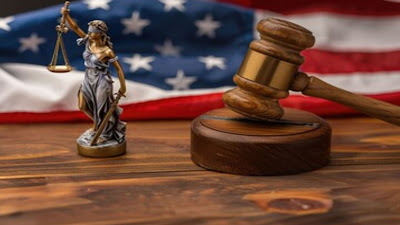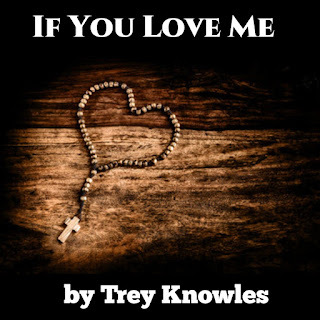Trey'von Knowles's Blog, page 31
December 17, 2024
The Matthew Project Chapter 3 - The Baptism of Jesus

Matthew Chapter 3:13-17 The Baptism of Jesus
Verse- 13. Then Jesus came from Galilee to the Jordan to be baptized by John. Verse - 14. But John tried to deter him, saying, “I need to be baptized by you, and do you come to me?”
Verse - 15. Jesus replied, “Let it be so now; it is proper for us to do this to fulfill all righteousness.” Then John consented.
Verse - 16. As soon as Jesus was baptized, he went up out of the water. At that moment heaven was opened, and he saw the Spirit of God descending like a dove and alighting on him. Verse - 17. And a voice from heaven said, “This is my Son, whom I love; with him I am well pleased."
Note: Jesus is the son of God. God spoke and said. This is my son. Matthew 3:17
December 16, 2024
The U.S. Government Commits Racketeering and Extortion

The U.S. Government Commits Racketeering and Extortion:
When saying "the enemy is like a light," it's typically a metaphorical reference to the idea that the enemy can appear deceptive or disguised as something good, like an "angel of light," often used in the Bible to describe Satan, who can mask his evil intentions with seemingly positive actions or appearances; essentially, the enemy might seem harmless or even beneficial on the surface, but their true nature is harmful. Take a look at The U.S. Government.
You pay for having a job. You pay for wanting a life. The U.S. Government is not God. The U.S. Government extorts money from businesses and individuals like gangs or organized crime it's called racketeering, extortion, or a protection racket: The U.S. Government legalizes her crime through Amendment 16 of the Constitution. This is how the U.S. Government slaves its people.
What is Racketeering:
Racketeering is a pattern of illegal activity that's often carried out by a criminal enterprise for profit, in this case, it is The U.S. Government. Money, Guns, and Lawyers the U.S. Government hides itself under Amendment 16 of the U.S. Constitution.
RICO stands for Racketeer Influenced and Corrupt Organizations Act that's provides for severe criminal penalties and civil lawsuits for actions taken as part of a criminal organization. Where is the RICO Act, when crimes are violated by the U.S. Government.
A hypocrite is someone who claims to have certain beliefs or values but behaves in a way that contradicts them: This is The U.S. Government.
Extortion:
Involves threatening to cause harm to a victim if they don't comply with the extortionist's demands either by killing, bodily harm or placing them in jail. Extortion can be committed verbally or in writing, The U.S. Government does it’s threatening force of action through the court system, federal agencies using Money, Guns, and Lawyers.
Sixteenth Amendment:
The Congress shall have power to lay and collect taxes on incomes, from whatever source derived, without apportionment among the several States, and without regard to any census or enumeration.
The U.S. Government Commits Racketeering and Extortion by using the Sixteenth Amendment.
https://crosssides.blogspot.com/
The Matthew Project Chapter 3 - John the Baptist Prepares the Way

Matthew Chapter 3 John the Baptist Prepares the Way
In those days John the Baptist came, preaching in the wilderness of Judea
Verse 2. and saying, “Repent, for the kingdom of heaven has come near.”
Note: Repent "Action word" Apply by turning from sin and dedicating oneself to the amendment of God. Changing the behavior.
Verse 3. This is he who was spoken of through the prophet Isaiah:
“A voice of one calling in the wilderness, ‘Prepare the way for the Lord, make straight paths for him.’”
Verse 4. John’s clothes were made of camel’s hair, and he had a leather belt around his waist. His food was locusts and wild honey.
Verse 5. People went out to him from Jerusalem and all Judea and the whole region of the Jordan.
Verse 6. Confessing their sins, they were baptized by him in the Jordan River.
Note: Confessing - Recognition of Wrong. Recognize the behavior.
Verse 7. But when he saw many of the Pharisees and Sadducees coming to where he was baptizing, he said to them: “You brood of vipers! Who warned you to flee from the coming wrath?
Verse 8. Produce fruit in keeping with repentance.
Note: Produce fruit in keeping with repentance- means live in the spirit of God continuously.
Verse 9. And do not think you can say to yourselves, ‘We have Abraham as our father.’ I tell you that out of these stones God can raise up children for Abraham.
Note: Obedience produces life. Commandments of God.
Verse 10. The ax is already at the root of the trees, and every tree that does not produce good fruit will be cut down and thrown into the fire.
Verse 11. “I baptize you with water for repentance. But after me comes one who is more powerful than I, whose sandals I am not worthy to carry. He will baptize you with the Holy Spirit and fire.
Note: Jesus will cleanse us by his spirit boiling our sinful nature to the will of God make us born again.
Verse 12 His winnowing fork is in his hand, and he will clear his threshing floor, gathering his wheat into the barn and burning up the chaff with unquenchable fire.”
Note: We who do good are the children of God, and we are the wheat.
Chaff means - worthless trash. Other words cannot be used. Not willing to submit to the will of God.
Movie Watch Below after skipping Ad: The Book of Matthew Chapter 3 - John the Baptist Prepares the Way
State Law vs Your Federal Rights

What happens when state law conflicts with federal law? The answer lies in a doctrine known as federal preemption. Generally, the preemption doctrine states that when a federal law conflicts with state law, the federal law prevails. While states may make their own laws, they must meet or exceed the federal standard.
The supremacy clause is in Article VI of the U.S. Constitution. Article VI says federal law is the "supreme law of the land." This clause means that judges in every state must follow the federal government's Constitution, federal laws, and treaties in matters directly or indirectly within the government's control.
The preemption doctrine comes from the supremacy clause. It states that federal law preempts state law when the laws conflict. Federal law also preempts state or local law if Congress intends to regulate an area and exclude the states. But case law involving federal preemption of state laws has shown that federal law should not preempt state law "unless that was the clear and manifest purpose of Congress" (Wyeth v. Levine).
In the absence of a federal law, that state law controls. Generally speaking, state regulations may provide more protection for people than federal law allows.
But, not all federal agency regulations preempt state regulations. As noted in the Supreme Court case Cipollone v. Liggett Group (1992), a presumption against preemption invokes federalism and state sovereignty principles. This presumption applies in all preemption cases (Altria Group Inc. v. Good).
Federalism and Enumerated Federal Powers
Under the supremacy clause, the federal government has broad powers to create, regulate, and enforce the laws of the United States. The concept of federalism, or federal power, has a long history dating back to the late 1700s when the U.S. ratified the Constitution.
In any preemption case, the analysis begins with the Constitution. The first question is whether the Constitution either expressly or implicitly preempts a state law. Another important factor that courts consider is Congress' intent when passing the federal law (Medtronic Inc. v. Lohr).
Express Preemption
The federal government has certain express or "enumerated" powers specifically spelled out in the Constitution. Article I, Section 8 contains these powers. Examples of express powers include:
The power to regulate commerce (the Commerce Clause). The power to declare war and raise armies. The power to make laws, such as immigration or bankruptcy laws, necessary to execute the government's power.When a federal statute or federal regulation expressly conflicts with a state law, the federal law or regulation will generally prevail. Some federal laws contain an express preemption clause. A preemption provision indicates the legislative branch had preemptive intent with the federal law or regulation. This congressional intent will preempt conflicting state laws.
Implied Preemption
The federal government has express powers and implied powers under the Constitution. Implied powers are not explicitly expressed in the Constitution. But, the government argues these implied powers come from the necessary and proper clause of the Constitution. This was the decision in the landmark Supreme Court case of McCulloch v. Maryland (1819). Examples of implied powers include:
The power to create a national bank The power to set a federal minimum wage The power to call for a military draftThere are two types of implied preemption. Field preemption is when the federal government determines it occupies an entire field of regulation. In Arizona v. Inter Tribal Council of Arizona (2013), the Supreme Court considered an Arizona state law that required voters to provide proof of citizenship to vote in a federal election.
The Supreme Court held that the National Voter Registration Act trumped the state law. The case stands for the idea that voter registration is an area the federal government controls.
Field preemption also applies to several instances in which the government has determined it has occupation of the field, including:
Nuclear powerMedical devicesImmigrationThe second type of implied preemption is conflict preemption. In Gade v. National Solid Wastes Management Association (1992), the Supreme Court determined that federal law preempts a state law that conflicts with federal law. Specifically, the court held that federal Occupational Safety and Health Administration (OSHA) regulations preempted Illinois laws on workers handling hazardous material.
Conflict preemption applies to several areas of law, including:
Drug manufacturers, drug administration, and drug labeling — e.g., the Food and Drug Administration's (FDA) federal regulatory schemes may preempt state court decisions on drug labeling
Foreign sanctions:
Automobile safety regulations, such as minimum safety standards
Whether express or implied, federal law will almost always prevail when it interferes or conflicts with state law. Unless the U.S. Supreme Court declares the federal law unconstitutional, or in situations where the supremacy clause does not apply, federal law will likely prevail. So, a federal court may prevent a state from enforcing a preempted state law.
But plenty of examples exist where tension between state and federal law remains unresolved. For instance, several states have legalized medical and recreational use of cannabis. Federal law deems cannabis a Schedule I controlled substance under federal law. The federal government, as of May 2024, is taking steps to reclassify cannabis as a Schedule II drug. In this case, it's mostly a matter of political will and resource allocation.
To that end, people in the United States should know about the federal government's broad powers. These issues include:
Bankruptcy claimsDiscrimination claimsImmigration challengesFederal TaxationA constitutional law attorney can help construe and interpret federal law as applied to a particular state law.
Examples of the Supremacy Clause: State vs. Federal Law
Example 1:
Suppose Pennsylvania enacts a law that says: "No citizen may sell blue soda anywhere in the state." But, in this scenario, the federal government has already established the "Anti-Blue Sales Discrimination Act."
This fictitious federal law bans actions that discriminate against goods sold based on color. A local food and beverage vendor who sells blue soda in vending machines gets charged with violating state law. The owner may challenge the state law because federal law preempts it. So, the vendor argues, the Pennsylvania law violates the supremacy clause of the U.S. Constitution.
Example 2:
Fictitious Company hires you as a non-exempt, full-time employee. Your state has set a minimum wage of $5 per hour, and the company declares this is your pay rate. But, the federal minimum wage is $7.25 per hour. Under federal law, Fictitious Company must pay you at least $7.25 per hour. The federal law will supersede the state's minimum wage.
https://crosssides.blogspot.com/
Your First Amendment Rights

The First Amendment of the United States Constitution protects the right to freedom of religion and expression from government interference. It prohibits any laws that establish a national religion, impede the free exercise of religion, abridge the freedom of speech, infringe upon the freedom of the press, interfere with the right to peaceably assemble, or prohibit citizens from petitioning for a governmental redress of grievances.
It was adopted into the Bill of Rights in 1791. The Supreme Court interprets the extent of the protection afforded to these rights. The First Amendment has been interpreted by the Court as applying to the entire federal government even though it is only expressly applicable to Congress. Furthermore, the Court has interpreted the Due Process Clause of the Fourteenth Amendment as protecting the rights in the First Amendment from interference by state governments.
Freedom of Religion
Two clauses in the First Amendment guarantee freedom of religion. The Establishment Clause prohibits the government from passing legislation to establish an official religion or preferring one religion over another. It enforces the "separation of church and state." However, some governmental activity related to religion has been declared constitutional by the Supreme Court. For example, providing bus transportation for parochial school students and the enforcement of "blue laws" is not prohibited. The Free Exercise Clause prohibits the government, in most instances, from interfering with a person's practice of their religion.
Freedom of Speech / Freedom of the Press
The most basic component of freedom of expression is the right to freedom of speech. Freedom of speech may be exercised in a direct (words) or a symbolic (actions) way. Freedom of speech is recognized as a human right under article 19 of the Universal Declaration of Human Rights.
The right to freedom of speech allows individuals to express themselves without government interference or regulation. The Supreme Court requires the government to provide substantial justification for interference with the right of free speech when it attempts to regulate the content of the speech. Generally, a person cannot be held liable, either criminally or civilly for anything written or spoken about a person or topic, so long as it is truthful or based on an honest opinion and such statements.
A less stringent test is applied for content-neutral legislation. The Supreme Court has also recognized that the government may prohibit some speech that may cause a breach of the peace or cause violence. For more unprotected and less protected categories of speech see advocacy of illegal action, fighting words, commercial speech, and obscenity. The right to free speech includes other mediums of expression that communicate a message. The level of protection speech receives also depends on the forum in which it takes place.
Despite the popular misunderstanding, the right to freedom of the press guaranteed by the First Amendment is not very different from the right to freedom of speech. It allows an individual to express themselves through publication and dissemination. It is part of the constitutional protection of freedom of expression. It does not afford members of the media any special rights or privileges not afforded to citizens in general.
Right to Assemble / Right to Petition
The right to assemble allows people to gather for peaceful and lawful purposes. Implicit within this right is the right to association and belief. The Supreme Court has expressly recognized that a right to freedom of association and belief is implicit in the First, Fifth, and Fourteenth Amendments. Freedom of assembly is recognized as a human right under article 20 of the Universal Declaration of Human Rights. This implicit right is limited to the right to associate for First Amendment purposes. It does not include a right of social association.
The government may prohibit people from knowingly associating with groups that engage in and promote illegal activities. The right to associate also prohibits the government from requiring a group to register or disclose its members or from denying government benefits on the basis of an individual's current or past membership in a particular group.
There are exceptions to this rule where the Court finds that governmental interests in disclosure/registration outweigh interference with First Amendment rights. The government may also, generally, not compel individuals to express themselves, hold certain beliefs, or belong to particular associations or groups.
The right to petition the government for a redress of grievances guarantees people the right to ask the government to provide relief for a wrong through litigation or other governmental action. It works with the right of assembly by allowing people to join together and seek change from the government.
https://crosssides.blogspot.com/
December 9, 2024
The Matthew Project Chapter 2 - The Escape to Egypt

Matthew Chapter 2
The Magi Visit the Messiah
2 After Jesus was born in Bethlehem in Judea, during the time of King Herod, Magi from the east came to Jerusalem 2 and asked, “Where is the one who has been born king of the Jews? We saw his star when it rose and have come to worship him.”
3 When King Herod heard this he was disturbed, and all Jerusalem with him. 4 When he had called together all the people’s chief priests and teachers of the law, he asked them where the Messiah was to be born. 5 “In Bethlehem in Judea,” they replied, “for this is what the prophet has written:
6 “‘But you, Bethlehem, in the land of Judah, are by no means least among the rulers of Judah; for out of you will come a ruler who will shepherd my people Israel.’
7 Then Herod called the Magi secretly and found out from them the exact time the star had appeared. 8 He sent them to Bethlehem and said, “Go and search carefully for the child. As soon as you find him, report to me, so that I too may go and worship him.”
9 After they had heard the king, they went on their way, and the star they had seen when it rose went ahead of them until it stopped over the place where the child was. 10 When they saw the star, they were overjoyed. 11 On coming to the house, they saw the child with his mother Mary, and they bowed down and worshiped him. Then they opened their treasures and presented him with gifts of gold, frankincense and myrrh. 12 And having been warned in a dream not to go back to Herod, they returned to their country by another route.
Movie Watch Below after skipping Ad: The Book of Matthew Chapter 3 - The Escape to Egypt!function(r,u,m,b,l,e){r._Rumble=b,r[b]||(r[b]=function(){(r[b]._=r[b]._||[]).push(arguments);if(r[b]._.length==1){l=u.createElement(m),e=u.getElementsByTagName(m)[0],l.async=1,l.src="https://rumble.com/embedJS/u2kzfpi&qu..., document, "script", "Rumble");Rumble("play", {"video":"v5vf5ut","div":"rumble_v5vf5ut"});
The Escape to Egypt
13 When they had gone, an angel of the Lord appeared to Joseph in a dream. “Get up,” he said, “take the child and his mother and escape to Egypt. Stay there until I tell you, for Herod is going to search for the child to kill him.”
14 So he got up, took the child and his mother during the night and left for Egypt, 15 where he stayed until the death of Herod. And so was fulfilled what the Lord had said through the prophet: “Out of Egypt I called my son.”
16 When Herod realized that he had been outwitted by the Magi, he was furious, and he gave orders to kill all the boys in Bethlehem and its vicinity who were two years old and under, in accordance with the time he had learned from the Magi. 17 Then what was said through the prophet Jeremiah was fulfilled:
18 “A voice is heard in Ramah, weeping and great mourning, Rachel weeping for her children and refusing to be comforted, because they are no more.”
Note: Rachel weeping for her children: Jacob's second wife. Mother of Joseph and Benjamin. Note: The same tribe was in bondage in Egypt in the days of Moses.
The Return to Nazareth
19 After Herod died, an angel of the Lord appeared in a dream to Joseph in Egypt 20 and said, “Get up, take the child and his mother and go to the land of Israel, for those who were trying to take the child’s life are dead.”
21 So he got up, took the child and his mother and went to the land of Israel. 22 But when he heard that Archelaus was reigning in Judea in place of his father Herod, he was afraid to go there. Having been warned in a dream, he withdrew to the district of Galilee, 23 and he went and lived in a town called Nazareth. So was fulfilled what was said through the prophets, that he would be called a Nazarene.
https://crosssides.blogspot.com/Song: If You Love Me

If You Love Me, This is how you show me. Keep my commandments.If You Love Me by Music Artist Trey KnowlesTruth & Knowledge
https://crosssides.blogspot.com/
Poetry: Defeat

Trey Knowles's Spoken Word Poetry "Defeat" teaches us we have the power to bring down strongholds that come against the image of God. We will not compromise. We will Defeat, with our weapons of obedience.
We are more than conquerors. We have the power to say No to ungodliness. We have the power to reject worldly passion and live a life that is self-controlled upright, and godly; essentially, we have the power to actively choose against actions that contradict God's will.
The Parable of the Tenants shows us that victory is already defeated.
it is written in Matthew 21:33-46.
33 “Listen to another parable: There was a landowner who planted a vineyard. He put a wall around it, dug a winepress in it and built a watchtower. Then he rented the vineyard to some farmers and moved to another place. 34 When the harvest time approached, he sent his servants to the tenants to collect his fruit.
35 “The tenants seized his servants; they beat one, killed another, and stoned a third. 36 Then he sent other servants to them, more than the first time, and the tenants treated them the same way. 37 Last of all, he sent his son to them. ‘They will respect my son,’ he said.
38 “But when the tenants saw the son, they said to each other, ‘This is the heir. Come, let’s kill him and take his inheritance.’ 39 So they took him and threw him out of the vineyard and killed him.
40 “Therefore, when the owner of the vineyard comes, what will he do to those tenants?”
41 “He will bring those wretches to a wretched end,” they replied, “and he will rent the vineyard to other tenants, who will give him his share of the crop at harvest time.”
42 Jesus said to them, “Have you never read in the Scriptures: “‘The stone the builders rejected
has become the cornerstone; the Lord has done this, and it is marvelous in our eyes’?
43 “Therefore I tell you that the kingdom of God will be taken away from you and given to a people who will produce its fruit. 44 Anyone who falls on this stone will be broken to pieces; anyone on whom it falls will be crushed.”
45 When the chief priests and the Pharisees heard Jesus’ parables, they knew he was talking about them. 46 They looked for a way to arrest him, but they were afraid of the crowd because the people held that he was a prophet.
Defeat
by Trey Knowles
https://crosssides.blogspot.com/
December 5, 2024
Toxicologist Dr Yvonne Burkart - Cancer Causing Products
Toxicologist and Chemical & Ingredient Safety Experthttps://crosssides.blogspot.com/
December 1, 2024
The Matthew Project Chapter 1 - Joseph Accepts Jesus as His Son

Matthew 1:18-25 Joseph Accepts Jesus as His Son
18 This is how the birth of Jesus the Messiah came about: His mother Mary was pledged to be married to Joseph, but before they came together, she was found to be pregnant through the Holy Spirit. 19 Because Joseph her husband was faithful to the law, and yet did not want to expose her to public disgrace, he had in mind to divorce her quietly.
Movie Watch Below after skipping Ad: The Book of Matthew Chapter 1 - Joseph Accepts Jesus as His Son!function(r,u,m,b,l,e){r._Rumble=b,r[b]||(r[b]=function(){(r[b]._=r[b]._||[]).push(arguments);if(r[b]._.length==1){l=u.createElement(m),e=u.getElementsByTagName(m)[0],l.async=1,l.src="https://rumble.com/embedJS/u2kzfpi&qu..., document, "script", "Rumble");Rumble("play", {"video":"v5svi7b","div":"rumble_v5svi7b"});20 But after he had considered this, an angel of the Lord appeared to him in a dream and said, “Joseph son of David, do not be afraid to take Mary home as your wife, because what is conceived in her is from the Holy Spirit. 21 She will give birth to a son, and you are to give him the name Jesus, because he will save his people from their sins.”
Note: Joseph was given a direct order. What to name the child.
22 All this took place to fulfill what the Lord had said through the prophet: 23 “The virgin will conceive and give birth to a son, and they will call him Immanuel” (which means “God with us”).
Note: The name Immanuel and Jesus means the same thing:
24 When Joseph woke up, he did what the angel of the Lord had commanded him and took Mary home as his wife. 25 But he did not consummate their marriage until she gave birth to a son. And he gave him the name Jesus.
https://crosssides.blogspot.com/


